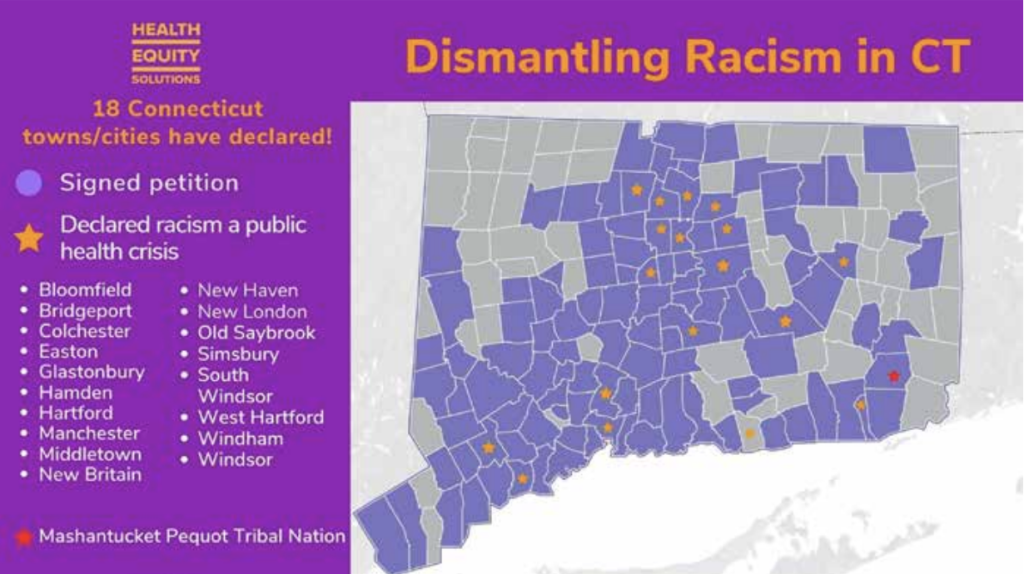Please Follow us on Gab, Minds, Telegram, Rumble, Gettr, Truth Social, Twitter
It's been nearly four years since the death of George Floyd, whom allegedly did not die from a drug overdose, but from complications of a rare tumor called a paraganglioma that can cause a fatal surge of adrenaline, according to a review of the autopsy report by pathologist Dr. William Schaetzel.
But Floyd's name is still being invoked in the name of racial equity, as yet another Connecticut town adopted a proclamation saying that "racism is a public health crisis" on January 31, 2024.
Now the Town of Fairfield joins other Connecticut municipalities that have adopted similar racial equity resolutions in the wake of George Floyd, such as Portland, Hamden, Windsor, Bloomfield, Middletown, Hartford and Trumbull.
Even the CT Examiner still refers to Floyd's death as a "killing" despite the autopsy report that seems to challenge that view.
The declaration of racism as a public health crisis in 2024 comes years after then Fairfield First Selectwoman Brenda L. Kupchick, said the Town formally created a Racial Equity and Justice Task Force (REJTF), "to identify any race or ethnic inequalities and to propose the means to eliminate them," on September 14, 2020.
"George Floyd’s murder in the Summer of 2020 prompted Fairfield residents to engage in honest conversations about race, racism, and disenfranchisement," said Kupchick at the time.
The REJTF subsequently produced a Racial Equity and Justice Task Force Blueprint for the Town of Fairfield, using definitions of race, racism, structural racism, equity and equality (and others) from the Anti-Defamation League.
The Blueprint detailed the REJTF's "deep listening" program whereby Fairfield residents who identified as something other than white were interviewed to better understand their "lived experiences" within the community.
The REJTF also analyzed Fairfield Public Schools to highlight how "systemic inequities, which are at times largely invisible to a majority population, can have insidious and long term impacts on already marginalized populations."
The Racial Equity Toolkit from the Connecticut Conference of Municipalities (CCM) provided guidance for the REJTF in creating its plan on dismantling alleged systemic racism in Fairfield, along with material provided by the National League of Cities (NLC). The Toolkit argues that a racial and equity lens should be applied to all new and ongoing strategic initiatives in order to "achieve equity" for policies, outcomes, power, relationships and solutions.

Three initial and immediate reactions resulted from the REJTF's Blueprint in January 2022:
The REJTF said that "explicitly acknowledging the existence and impact of systemic racism clears a path to addressing the disparities and inequities it causes; it is one way to hold town government accountable and it signals solidarity with residents of color."
Accordingly, the REJTF claimed that issuing a proclamation and/or statement about racism being a health crisis is actually a "standard best practice in both the private and public sectors".
And that such declarations acknowledge the "trauma inflicted by racism and the purposeful disinvestment in their social and economic well-being, people of color live, for example, with disproportionately higher cortisol 13 levels, higher rates of chronic stress, higher rates of chronic disease, lower infant birth rates, higher rates of COVID-19 infection."
The State of Connecticut made the declaration on June 1st, 2021, in a vote of 114-33, that
racism was a public health crisis in Connecticut.
But Fairfield didn't adopt the proclamation that racism was a public health crisis until January 2024, right after Democrat Bill Gerber assumed the role of first selectman.
Gerber narrowly beat Kupchick in a race so tight that it triggered an automatic recount, along with whispers that "Kupchick got Bridgeported", especially after party officials fought about rules during the recount.


Pathetic. What they're saying is that Fairfield and the rest of Connecticut is racist. I don't care to be stereotyped like that; in itself, THAT is racist. And I worry about the effect this will have on free speech and expression, which already is at risk in town.